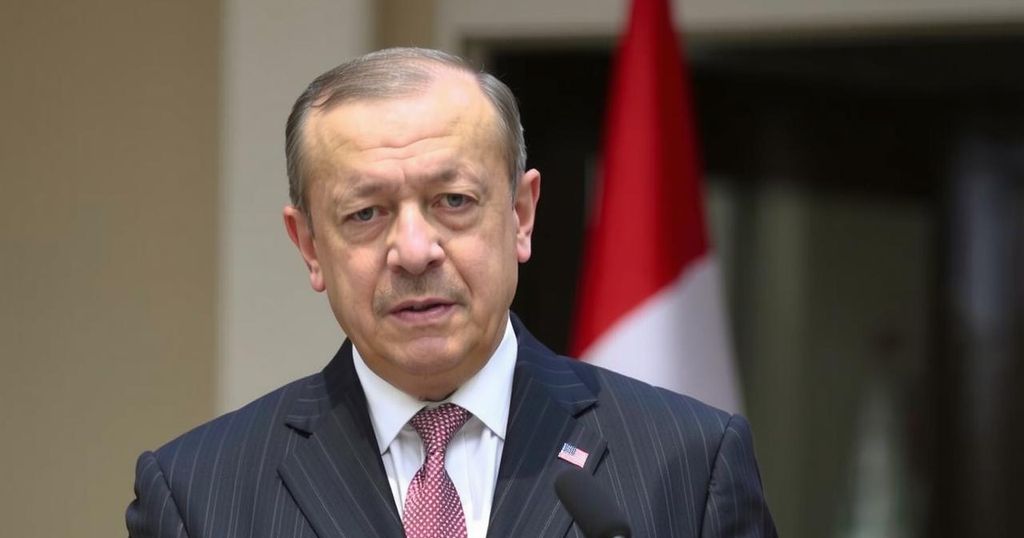Erdogan’s Upcoming Visit to Cairo: A Focus on Syrian Affairs and Regional Diplomacy

Turkey’s President Erdogan is visiting Egypt to discuss the implications of Syria’s transition to a new government with President el-Sisi. The discussions highlight Erdogan’s growing influence post-Assad and concerns regarding HTS. The meeting coincides with a D-8 summit and aims to enhance bilateral cooperation in the region, addressing reconstruction and stability in Syria.
Turkey’s President Recep Tayyip Erdogan is scheduled to engage in discussions with Egyptian President Abdel Fattah el-Sisi in Cairo, primarily focusing on the evolving situation in Syria. This meeting is set against the backdrop of Egypt seeking to enhance its relationship with Turkey, particularly concerning its interests following the recent establishment of a new Syrian government. Erdogan’s visit coincides with a D-8 summit in Cairo on December 19, 2024.
Erdogan’s engagement with Egypt signifies a notable shift in regional dynamics post the toppling of the Assad regime, with Syrian rebels forming a transitional government. Turkish officials have confirmed the proactive efforts made by Egypt to secure Erdogan’s visit, emphasizing the importance of direct talks between Sisi and Erdogan regarding Syria. Turkey has historically been a key supporter of Syrian opposition groups.
In a notable recent development, the head of Turkey’s intelligence agency, Ibrahim Kalin, was sighted visiting Damascus, underscoring Turkey’s substantial influence over Syrian rebel factions. This interaction reflects the ongoing dialogue amongst regional powers about Syria’s future amidst trepidations regarding the influence of groups like Hay’at Tahrir al-Sham (HTS), a former al-Qaeda affiliate, which continues to be labeled as a terrorist organization by multiple Western states.
The growing influence of HTS has raised considerable concerns in various Arab states, leading to diplomatic engagements to ensure stability in the region. Despite historical tensions, especially in the context of previous support by Erdogan for Syrian rebels and his opposition to Sisi’s regime during the Arab Spring, there appears to be an emerging consensus regarding the necessity for cooperative dialogue.
The ramifications of the Assad regime’s collapse are profound, significantly affecting Iran’s operational capabilities in the region, particularly in relation to Hezbollah. With Iran’s president, Masoud Pezeshkian, also anticipated to attend the Cairo summit, Sisi’s objective is to facilitate dialogue between Erdogan and his Iranian counterpart. In this complex geopolitical landscape, the discussions are likely to cover not only Syria’s transitional governance but also regional cooperation and reconstruction efforts.
The upcoming meeting between Erdogan and Sisi could potentially serve as a pivotal moment in reorienting relations in the region and addressing the broader challenges posed by the ongoing crises in Syria. Following years of rivalry, this dialogue may also illustrate a willingness among Arab states to recalibrate their foreign policies in pursuit of stability.
The backdrop of President Erdogan’s upcoming visit to Cairo involves significant shifts in Syrian governance following the recent overthrow of the Assad government. Erdogan’s previous support for opposition forces has granted him substantial influence over the Syrian National Army. The political landscape in Syria has evolved dramatically since the Arab Spring, leading to a reevaluation of relationships among Middle Eastern states amidst fears regarding militant organizations like HTS potentially rising to power. This evolving situation presents both challenges and opportunities for diplomatic resolutions in the region.
In summary, President Erdogan’s scheduled visit to Cairo marks a critical juncture for Turkish-Egyptian relations in the context of Syria’s recent governmental changes. The meeting signals a potential turning point in regional diplomacy, particularly as stakeholders seek to navigate the complexities of post-Assad governance, influence of militant groups, and joint reconstruction efforts. Both leaders appear prepared to redefine their countries’ roles amid a restructured geopolitical landscape, reflecting a wider trend towards collaboration in the pursuit of stability in the region.
Original Source: www.middleeasteye.net








